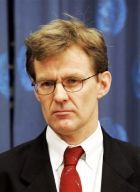World must act on Darfur situation, urges Egeland
NAIROBI, Feb 21, 2005 (IRIN) — Millions of people are at risk of starvation
unless the international community acts quickly on the situation in the
war-torn western Sudanese region of Darfur, Jan Egeland, the UN’s
emergency relief coordinator, said.

“Some are predicting four million, some are predicting – that [more]
people [are] in desperate need of life-saving assistance as we approach
the hunger gap in mid-year,” Egeland told a news conference in New York on
Friday.
“We did prevent the massive famine that many predicted, but I think now
its time to say we may perhaps not be able to do so in the coming months
if the situation keeps on deteriorating,” UN News reported him as saying.
Continued violence in Darfur, he added, was seriously hampering aid
efforts in the region. “Aid workers have been killed, our helicopters have
been shot at, our trucks are being looted there, we are paralysed,”
Egeland noted. “We could have provided daily bread for more than two
million people. We are, at best, giving to 1.5 million. This cannot
continue.”
He commended the humanitarian community – the UN, NGOs, the Red Cross and
Red Crescent Societies – for their role in providing relief to the
vulnerable of Darfur. He noted that there were about 9,000 aid workers on
the ground, with close to 1,000 being international.
“Our staff on the ground is really working round the clock and are burning
themselves out faster than anywhere else that I’ve seen in recent memory,”
he said.
Noting that the UN had received just half of the US $650 million pledged
for the region, Egeland called for a tsunami-style increase in relief to
Darfur, a reference to the massive international mobilisation of aid for
those affected by the Indian Ocean tsunami last December.
However, he warned, relief aid alone was insufficient. The international
community had to take further action to end the ongoing massacres, he
added.
He called for a four- to five-fold increase in the African Union
monitoring force in Darfur, for robust mediation and for more pressure to
be brought to bear on government, rebels, ethnic and local leaders who
“take those positions that lead to [the] massive killing of women and
children”.
Urging members of the UN Security Council to set aside their differences
on Darfur for the sake of resolving the conflict, Egeland said: “Too often
the world sends us – the band-aid – and the world believes that we keep
people alive and then they don’t have to take a political [or] security
action.”
The conflict in Darfur, which broke out in 2003, pits the Sudanese
government and militias, allegedly allied to it, against rebels opposed to
what they call the marginalisation and discrimination of the region by the
government. The hostilities have seen up to 70,000 killed and up to 1.9
million people displaced from their homes.
